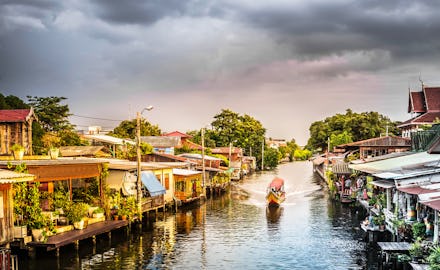What is “conscious travel” — and why does it matter?

Kyle Michaud didn’t intend to travel consciously during his trip to Jinka, a small market town Ethiopia. The opportunity presented itself organically.
“I spent most of my time with the locals and realized that they didn’t have the same opportunities in life that most of us do. I found a realistic way to make a change in these people’s lives to give them opportunity,” said Michaud, the founder of Experience Expositions.
Noticing the children in the community were “craving education,” he started by donating 70 English books. The response was so positive that it inspired him to deliver books to children around the world. This year, he sent 24 Ethiopian children and two Sri Lankan children to school, as well as new clothing and books to 63 children in Ethiopia.
Make no mistake: conscious travel doesn’t require you perform as grand a gesture as paying for someone’s education. As Michaud puts it, it’s a way to derive more meaning from your travels, but especially to enhance the lives of the citizens of your destination in some minute but impactful way.
“When you conscious travel, you want your travels to be just as fulfilling for others. [It’s] about connecting with a place, the community and people, and genuinely doing something purposeful,” he said. “When I conscious travel, I set out to build relationships and make a positive impact on the location I visit. It’s a type of wellness travel, but it’s mutually beneficial. I feel good when I travel and help others, but the way I look at conscious travel is simple: Do the people I’m interacting with feel just as good that I’m there?”
The rise in conscious travel couldn’t come at a better time. According to research from OnePoll on behalf of Exodus Travels, 78 percent of travelers define themselves as more “ethically conscious” than they were a decade ago. In that same survey, participants defined an ethical trip as one where they learned about the culture, learned simple phrases in the destination’s language and bought souvenirs from local merchants. Conscious travel is thus a way to fulfill travelers’ growing needs to give back in an ethical way.
It’s important to distinguish being helpful to a certain community, and performing heroic acts for publicity. Due to the growing “voluntourism” trend, you might see white westerners posing with African children on social media, which NPR described as a result of the white-savior complex. There’s a sense of humility and altruism inherent in conscious travel, so there is no place for using locals as props for your social media feeds.
With that in mind, here’s why adopting the “conscious traveler” mentality can make the world a better place.
It can help the local economy
One way to practice conscious travel is to intentionally visit a destination that can financially benefit from your stay. “The money you spend while visiting these places funnels back into their communities. Try to buy gifts from local sellers, shop at local markets or eat at local restaurants instead of chains. Instead of staying at a huge resort or hotel, look at your options for locally owned accommodations,” said Michaud. If you’re not sure where to start, he recommended asking the locals and merchants directly what their community needs.
According to Tom Harari, senior manager of responsible tourism, product and commercial for Exodus Travels, it’s important to make an effort to book with companies who prioritize conscious travel. This can range from anything to respecting animals’ habitats to supporting the community by sticking strictly to local tour guides.
It can gives you a greater understanding of your destination
It’s one thing to look at a map and be able to navigate the location on the surface — it’s another to dive into its culture, customs and traditions. You don’t need to wait for your plane to land in order to begin your education process. Michaud added that it’s a sign of respect to read up on the destination’s culture before your trip so that you’re better equipped to interact with the locals, and are better equipped to help them in a way that is meaningful to them.
“It’s important to make time for cultural excursions or educational experiences on every trip you go on. These are definitely some small, but impactful ways to begin to think about and practice conscious travel,” he said.
It changes your worldview after the trip
Conscious travel is less an isolated incident relegated to your vacation, and more of a mindset that extends well into your everyday life. Michaud said you can achieve this by staying in touch with the locals you meet on your trip, and continue to work with them once you return home. “Conscious travel is not always about the work you do on the ground, but the relationships you make in that area,” he said.
For more inspiration on how to travel consciously, visit GOOD Travel before your next trip. “They inspire travelers and tourism businesses to transform the travel industry into a force for good,” Michaud said.